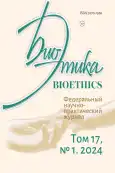International medical educational space in the context of digital civiliza-tion
- Authors: Alshuk N.A.1, Abenavoli L.2, Batirov D.Y.3
-
Affiliations:
- Volgograd State Medical University
- University Magna Græcia of Catanzaro
- Urgench Branch of the Tashkent Medical Academy
- Issue: Vol 17, No 1 (2024)
- Pages: 44-50
- Section: Practical bioethics
- URL: https://journal-vniispk.ru/2070-1586/article/view/256741
- DOI: https://doi.org/10.19163/2070-1586-2024-17-1-44-50
- ID: 256741
Cite item
Full Text
Abstract
A modern university is a place where meanings are created. These meanings are transmitted primarily through the university's website, through social networks, where the university is represented. To put it in marketing terms, it is through digital resources that the university is looking for clients-students. And this is where educational, scientific, and commercial interests intersect, which makes it fundamentally important to universalize ethical requirements for all participants in this process. At the same time, digital transformation is becoming an objective necessity for the development of education and the formation of a client base for the future, as well as for maintaining contacts with students' parents and graduates. And it is those universities that get involved in this process faster and better that will benefit. The university's website is the main resource where its meanings are broadcast and moral stories are objectified. Aim: to clarify the concept of digitalization of medical education as an international phenomenon regulated by general ethical and social requirements. To date, there is no universally accepted definition of such a concept as digitalization of medical education, since this term is a rather complex multifaceted phenomenon.
We are considering medical education, the possibility of obtaining it using digital technologies, analyzing the volume of built-in digital education, its feasibility and relevance. The website is the main resource of the university in terms of marketing, information, education and regulatory regulation of the entire learning process. Special requirements are imposed on its form and content in the situation of teaching medical students in a foreign language environment.
Full Text
##article.viewOnOriginalSite##About the authors
Natalya A. Alshuk
Volgograd State Medical University
Author for correspondence.
Email: nalshuk@volgmed.ru
ORCID iD: 0000-0001-5657-575X
Head of the Department of External Relations
Russian Federation, VolgogradLudovico Abenavoli
University Magna Græcia of Catanzaro
Email: l.abenavoli@unicz.it
ORCID iD: 0000-0002-5922-1524
MD, Associate Professor of Gastroenterology
Italy, CatanzaroDavronbek Yu. Batirov
Urgench Branch of the Tashkent Medical Academy
Email: dbatirov@yandex.ru
ORCID iD: 0009-0004-3724-2334
Candidate of Medical Sciences, Associate Professor, Head of the Department of Surgical Diseases and Transplantology, Deputy Director for International Cooperation
Uzbekistan, UrgenchReferences
- Benaida M. Cross-Cultural Web Design and Education: A Comparison Between Arab Universities and US Universi-ties Based on Hofstede Cultural Dimensions. IJCSNS Inter-national Journal of Computer Science and Network Securi-ty. 2018;18(10). URL: https://www.semanticscholar.org/paper/ Cross-Cultural-Web-Design-and-Education%3A-A-Between-Benaida/84606e609b7d67cb682d726d48639d953abe84c2
- Kuzin T.S. On the Issue of the Peculiarities of Personality Perception of Information in the Mass Communication Me-dia, Taking into Account the Ethnic Mentality. Mir sov-remennoi nauki = The world of modern science. 2011;5. (in Rus.) URL: https://cyberleninka.ru/article/n/k-voprosu-ob-osobennostyah-vospriyatiya-lichnostyu-informatsii-sredstv-massovoy-kommunikatsii-s-uchetom-etnicheskogo-mentaliteta.
- Das Th.M., Kaur G., Nematollahi S. et al. Medical Educa-tion in the Digital Era: A New Paradigm for Acquiring Knowledge and Building Communities. JACC: Advances. 2022;1(2):100031. URL: https://www.jacc.org/doi/10.1016/ j.jacadv.2022.100031.
- Car L.T., Poon S., Myint K.B. et al. Digital Education for Health Professionals: An Evidence Map, Conceptual Framework, and Research Agenda. National Library of Medicine. 2022;24(3): e31977. doi: 10.2196/31977. PMID: 35297767; PMCID: PMC8972116. URL: https://www.ncbi. nlm.nih.gov/pmc/articles/PMC8972116/
- Althubaiti A., Tirksstani J. M., Alsehaibany A.A. et al. Dig-ital transformation in medical education: Factors that influ-ence readiness. Health Informatics J. 2022;28(1): 14604582221075554. doi: 10.1177/14604582221075554.
- Lazarenko V.A., Kalutskiy P.V., Dremova N.B., Ovod A.I. Adaptation of Higher Medical Education to the Conditions of Digitalization of Health Care. Vysshee obrazovanie v Rossii = High education in Russia. 2020;1:106–115. (in Rus.) URL: https://cyberleninka.ru/article/n/adaptatsiya-vysshego-meditsinskogo-obrazovaniya-k-usloviyam-tsifrovizatsii-zdravoohraneniya/viewer.
- Tiago Taveira-Gomes, Areo Saffarzadeh, Milton Severo et al. A novel collaborative e-learning platform for medical students – ALERT STUDENT. BMC Medical Education. 2014;143. doi: 10.1186/1472-6920-14-143.
Supplementary files







